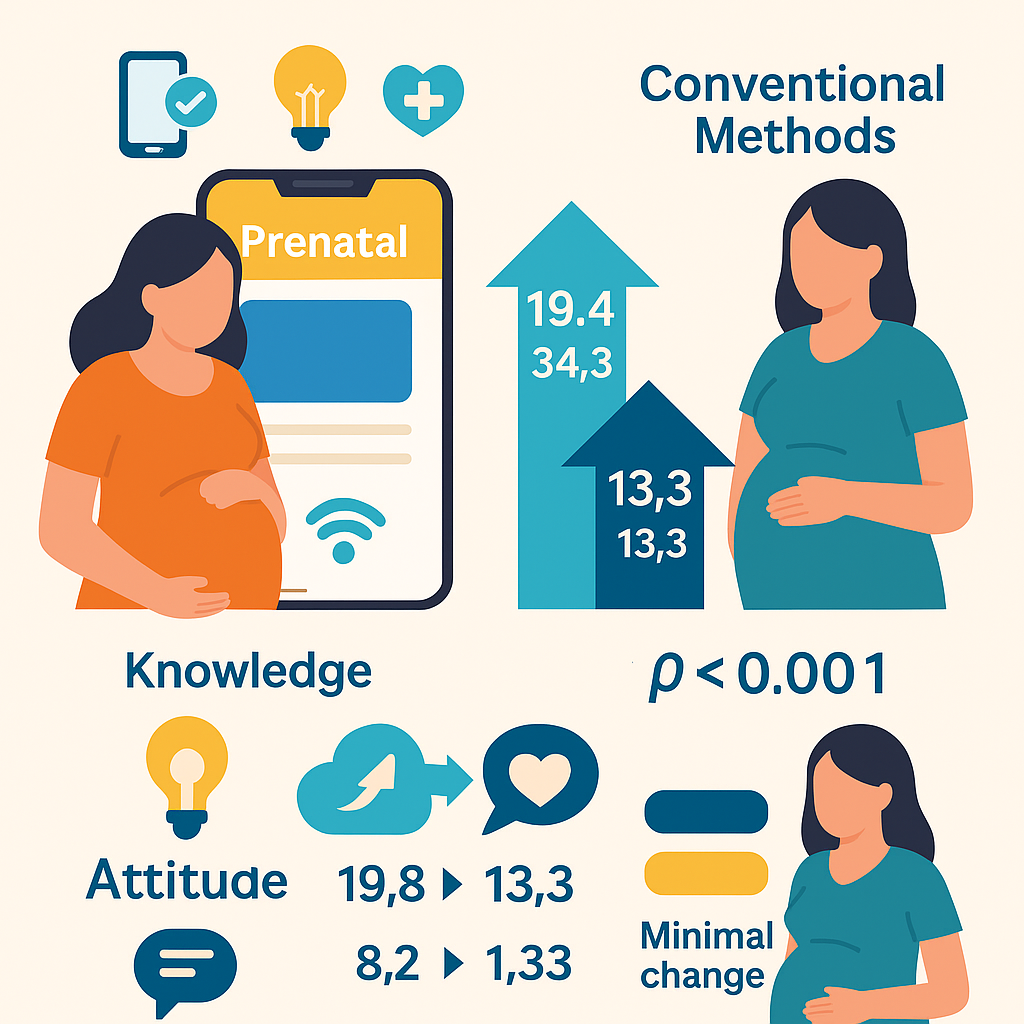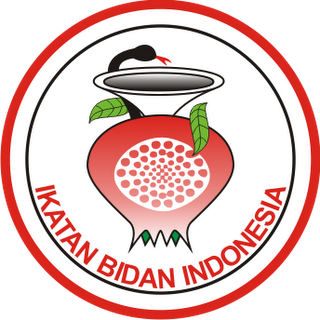A Quasi-Experimental Study of Mobile Health Intervention: Measuring the Impact of Android-Based Prenatal Classes on Knowledge and Attitudes of First-Time Mothers in Indonesia
https://doi.org/10.33860/jbc.v7i1.4184
Keywords:
maternal health, digital health, m-health, pregnancy, health educationAbstract
Introduction: Maternal mortality remains a critical global health challenge, with approximately 287,000 pregnancy-related deaths recorded in 2020 (WHO, 2024). In Indonesia, where maternal healthcare access varies significantly, digital interventions may offer scalable solutions. This quasi-experimental study evaluates the effectiveness of an Android-based prenatal education application in improving knowledge and attitudes among first-time mothers in Cimahi, West Java. By comparing app-based learning with traditional methods, we assess whether mobile technology can help bridge gaps in maternal health education and contribute to safer pregnancy outcomes. Methods: This quasi-experimental study involved 120 first-trimester primigravida women (60 intervention, 60 control) in Cimahi City. The independent variable was the use of an Android-based prenatal education application; dependent variables were maternal knowledge and attitudes. Instruments included a validated 20-item knowledge test and a 10-item attitude Likert scale. Data were analyzed using paired and independent t-tests, as well as SmartPLS path modeling. Results: In the intervention group, knowledge scores increased from 19.8 ± 2.1 to 34.3 ± 2.0, and attitude scores improved from 8.2 ± 1.2 to 13.3 ± 2.8 (p < 0.001). The control group showed smaller, non-significant changes (knowledge: 19.5 ± 2.2 to 21.5 ± 2.6; attitude: 7.3 ± 1.5 to 8.3 ± 1.6). Post-test differences between groups were statistically significant (p < 0.001). Conclusion: The Android-based prenatal education application significantly enhanced the knowledge and attitudes of first-time pregnant women. These findings support the integration of digital education into routine antenatal care services.
Downloads
References
Alam, C. El, Abou-Abbas, L., Ramadan, M. S., & Asmar, M. K. (2025. Exploring the barriers to accessing antenatal care at the primary health care center level of a tertiary hospital in Lebanon: a qualitative study. BMC Health Services Research, 25(1, 1–14. https://doi.org/10.1186/s12913-025-12444-y
Balasoiu, A. M., Olaru, O. G., Sima, R. M., & Ples, L. (2021. How did prenatal education impact women’s perception of pregnancy and postnatal life in a romanian population. Medicina (Lithuania, 57(6, 1. https://doi.org/10.3390/medicina57060581
Choudhury, A., & Choudhury, M. (2022. Mobile for mothers mHealth intervention to augment maternal health awareness and behavior of pregnant women in tribal societies: randomized quasi-controlled study. JMIR MHealth and UHealth, 10(9, 1. https://doi.org/10.17605/OSF.IO/9U8D5
Dewau, R., Muche, A., Fentaw, Z., Yalew, M., Bitew, G., Amsalu, E. T., Arefaynie, M., & Mekonen, A. M. (2021. Time to initiation of antenatal care and its predictors among pregnant women in Ethiopia: Cox-gamma shared frailty model. Plos One, 16(2, 1–18. https://doi.org/10.1371/journal.pone.0246349
Dinkes Cimahi. (2021. Profil Kesehatan Kota Cimahi Tahun 2021.
Dinkes Jabar. (2023. Profil Kesehatan Provinsi Jawa Barat Tahun 2023.
Ernawati, I. F., Wardani, R., Indasah, I., & Kumalasari, N. (2022. Penyuluhan Kelas Ibu Hamil di UPT. Puskesmas Sei Tatas Kecamatan Pulau Petak Kabupaten Kapuas Kalimantan Tengah. Jurnal Pengabdian Mandiri, 1(8, 1557–1568. https://bajangjournal.com/index.php/JPM/article/view/3376
Filip, R., Gheorghita Puscaselu, R., Anchidin-Norocel, L., Dimian, M., & Savage, W. K. (2022. Global challenges to public health care systems during the COVID-19 pandemic: a review of pandemic measures and problems. Journal of Personalized Medicine, 12(8, 1295–1317. https://doi.org/10.3390/jpm12081295
Free, C., Phillips, G., Felix, L., Galli, L., Patel, V., & Edwards, P. (2010. The effectiveness of M-health technologies for improving health and health services: A systematic review protocol. BMC Research Notes, 3(250, 1. https://doi.org/10.1186/1756-0500-3-250
Fuada, N., & Setyawati, B. (2015. Pelaksanaan kelas ibu hamil di Indonesia. Indonesian Journal of Reproductive Health, 6(2, 67–75. https://media.neliti.com/media/publications-test/107594-pelaksanaan-kelas-ibu-hamil-di-indonesia-dc03e1b8.pdf
Indonesian Health Profile. (2018. Profil Kesehatan Indonesia (2018. https://kemkes.go.id/id/category-download/profil-kesehatan
Lubis, K., Simanjuntak, P., & Manik, D. J. (2022. Faktor-Faktor Yang Mempengaruhi Rendahnya Kunjungan Antenatal Care Di Puskesmas Gunung Baringin Kec. Panyabungan Timur Mandailing Natal Tahun 2022. Jurnal Ilmu Kedokteran Dan Kesehatan Indonesia, 2(3, 29–38. https://doi.org/10.55606/jikki.v2i3.662
Moise, I. K., Ivanova, N., Wilson, C., Wilson, S., Halwindi, H., & Spika, V. M. (2023. Lessons from digital technology-enabled health interventions implemented during the coronavirus pandemic to improve maternal and birth outcomes: a global scoping review. BMC Pregnancy and Childbirth, 23(1, 1. https://doi.org/10.1186/s12884-023-05454-3
Peprah, P., Abalo, E. M., Agyemang-Duah, W., Gyasi, R. M., Reforce, O., Nyonyo, J., Amankwaa, G., Amoako, J., & Kaaratoore, P. (2019. Knowledge, attitude, and use of mHealth technology among students in Ghana: A university-based survey. BMC Medical Informatics and Decision Making, 19(1, 1. https://doi.org/10.1186/s12911-019-0947-0
Perera, C. (2012. The Evolution of E-Health – Mobile Technology and mHealth. Journal of Mobile Technology in Medicine, 1(1, 1–2. http://dx.doi.org/10.7309/jmtm.1
Sener, D. K., & Cimete, G. (2016. A program based on Social Cognitive Theory and Smith’s model of health and illness and its effect on maternal self-efficacy and child behavior. Children and Youth Services Review, 64, 82–90. https://doi.org/10.1016/j.childyouth.2016.03.007
Sharma, A., Harrington, R. A., McClellan, M. B., Turakhia, M. P., Eapen, Z. J., Steinhubl, S., Mault, J. R., Majmudar, M. D., Roessig, L., Chandross, K. J., Green, E. M., Patel, B., Hamer, A., Olgin, J., Rumsfeld, J. S., Roe, M. T., & Peterson, E. D. (2018. Using Digital Health Technology to Better Generate Evidence and Deliver Evidence-Based Care. Journal of the American College of Cardiology, 71(23, 2680–2690. https://doi.org/10.1016/j.jacc.2018.03.523
Sharma, P., & Kaur, P. D. (2017. Effectiveness of web-based social sensing in health information dissemination—A review. Telematics and Informatics, 34(1, 194–219. https://doi.org/10.1016/j.tele.2016.04.012
Shi, L., Yuan, L., Zhou, L., Zhang, S., & Lei, X. (2021. Study on the Impact of Online Courses for Pregnant and Lying-In Women on Maternal and Infant Health during the Epidemic. Journal of Healthcare Engineering, 2023(1, 1–11. https://doi.org/10.1155/2021/4019210
Tanjung, F., Effendy, I., Niswati Utami, T., & Syafitri Nasution, R. (2024. Analisis Faktor yang Mempengaruhi Kunjungan Antenatal Care (ANC. Jurnal Kebidanan Khatulistiwa, 10(2, 79–90. https://doi.org/10.30602/jkk.v10i2.1317
Terry, K. (2023. Taking Advantage of Health IT: Applying New Technology, Care Collaboration, and Telemedicine. The Journal of Medical Practice Management, 38(4, 184–191. https://doi.org/10.55834/halmj.3831836586
Vamos, C. A., Merrell, L., Detman, L., Louis, J., & Daley, E. (2019. Exploring Women’s Experiences in Accessing, Understanding, Appraising, and Applying Health Information During Pregnancy. Journal of Midwifery and Women’s Health, 64(4, 472–480. https://doi.org/10.1111/jmwh.12965
WHO. (2025, April 7. Maternal mortality. World Health Organization. https://www.who.int/news-room/fact-sheets/detail/maternal-mortality

Downloads
Published
How to Cite
Issue
Section
License
Copyright (c) 2025 Erni Hernawati, Hafizh Che Hassan, Nisha Nambiar, Sofa Nurul Hidayati (Author)

This work is licensed under a Creative Commons Attribution-ShareAlike 4.0 International License.
Authors who publish with Jurnal Bidan Cerdas agree to the following terms:
- Authors retain copyright and grant the journal right of first publication with the work simultaneously licensed under a Creative Commons Attribution License (CC BY-SA 4.0) that allows others to share the work with an acknowledgment of the work's authorship and initial publication in this journal.
- Authors are able to enter into separate, additional contractual arrangements for the non-exclusive distribution of the journal's published version of the work (e.g., post it to an institutional repository or publish it in a book), with an acknowledgment of its initial publication in this journal.
- Authors are permitted and encouraged to post their work online (e.g., in institutional repositories or on their website) prior to and during the submission process, as it can lead to productive exchanges, as well as earlier and greater citation of published work.

This work is licensed under a Creative Commons Attribution-Share Alike 4.0 International License
You are free to:
- Share, copy and redistribute the material in any medium or format
- Adapt, remix, transform, and build upon the material for any purpose, even commercially.
- The licensor cannot revoke these freedoms as long as you follow the license terms.




